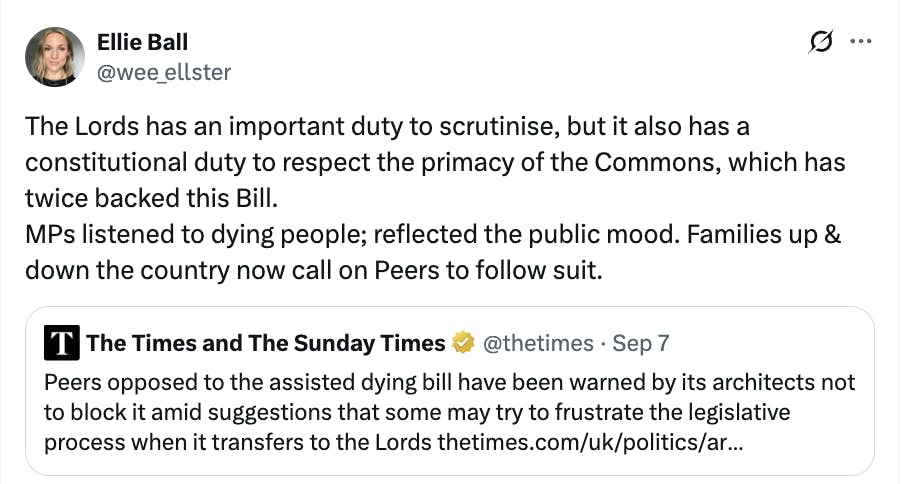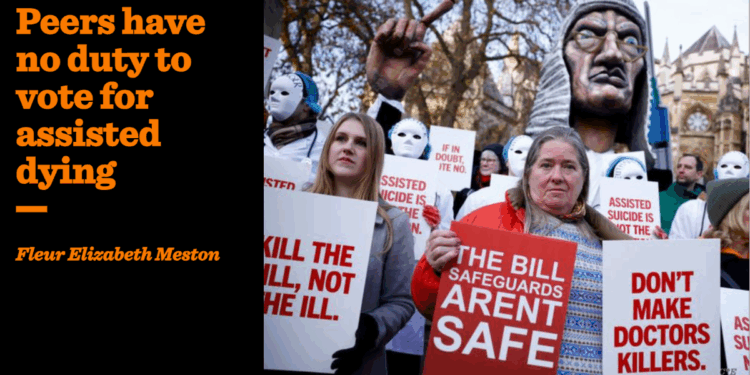Ellie Ball, Director of Communications at Dignity in Dying and Compassion in Dying, posted on X recently that “The Lords has an important duty to scrutinise, but it also has a constitutional duty to respect the primacy of the Commons, which has twice backed this Bill. MPs listened to dying people; reflected the public mood. Families up & down the country now call on Peers to follow suit.”
This is a deeply misleading claim. The suggestion that the House of Lords has a constitutional duty to defer to the Commons on a Private Members’ Bill (PMB) is simply false. The doctrine of Commons primacy derives from legislation that comes from a government manifesto or from bills the Commons has insisted upon in two consecutive sessions. Neither applies here. The Terminally Ill Adults (End of Life) Bill is a Private Members’ Bill that has not passed the House of Commons in two sessions.

Peers are not obligated to accept a Private Members’ Bill. In fact, precedent demonstrates this. In 2014, the Lords blocked James Wharton’s European Union (Referendum) Bill because many peers rejected its content and principle. They exercised their constitutional right to do so, since, as a Private Members’ Bill, it was not subject to a binding duty to advance, unlike government bills that reflect manifesto commitments.
Ellie Ball’s assertion, therefore, not only gravely misunderstands our constitutional settlement but also misleads peers and the public about what is at stake. The head of comms for Dignity in Dying, known for the “Westminster death tunnel”, appears to lack expertise in parliamentary procedure. Her professional background includes communications work at Macmillan Cancer Support, not constitutional law.
Two further omissions make her comments even more disingenuous. First, less than half of MPs actually voted for the Bill at third reading — 314 out of 650 members. Second, there is no constitutional duty for peers to “respect” such a half-supported PMB. To propose anything different is merely a political tactic presented as if it were a constitutional principle.
Kim Leadbeater MP stated that peers should not block the Bill, saying that the Lords should scrutinise and suggest, not obstruct legislation. Former Lord Chancellor Lord Falconer likewise claims that “the norm in the Lords is that you don’t oppose a second reading”. Yet both know perfectly well the House retains the discretion to halt a bill, especially a PMB, if the principle itself is unsound. Lord Falconer is no stranger to voting against Commons-backed bills in the Lords; despite now insisting peers should always defer, he has himself opposed such legislation on several occasions, including attempts to block or amend major government bills passed by the elected chamber.
Leadbeater spoke at a parliamentary meeting hosted by My Death, My Decision and Humanists UK, who advocate for expanding assisted suicide beyond the terminally ill. These groups are clear about their desire to go beyond the supposed safeguards within Leadbeater’s bill. At the meeting, a Dignitas board member used chilling doublespeak, claiming, “Assisted dying is not about ending lives. In fact, it’s about saving lives”.
This appears to be a campaign based on misleading language and tricks. Peers bear no obligation simply to nod this bill through. The duty of the House of Lords is not to Dignity in Dying’s spin doctors, but to the constitutional settlement in our parliamentary democracy, and to vulnerable people who would be placed at risk by legalising assisted suicide.
When the communications head for the assisted suicide lobby spreads misleading claims, it is no surprise that many remain sceptical about the true intentions of the Bill’s sponsors, parliamentary champions, and campaign groups such as Dignity and Dying and My Death, My Decision. Sometimes the greatest act of principle is not to defer, but to resist.












